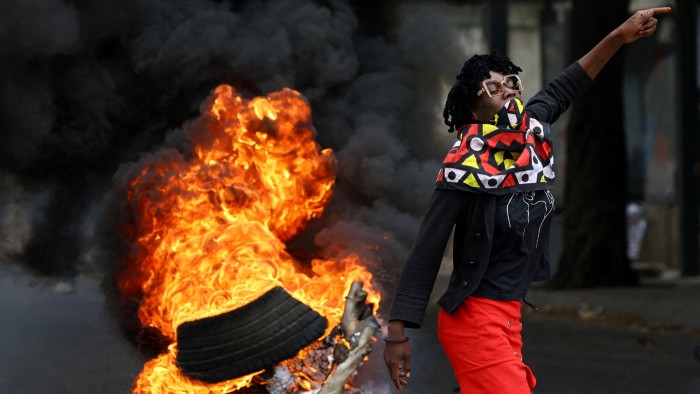Bloody protests in Mozambique over the country’s disputed general elections have escalated into an attempted coup, according to Frelimo, the governing party that was declared the victor in the polls.
Alcinda de Abreu, spokesperson for Frelimo, which has held power since the country’s liberation from Portugal 49 years ago, said the violence amounted to an “assault” on a democratically elected government.
“We have seen calls for violence, insubordination, general insurrection and finally an attempted coup d’état,” she said on state television.
But Adriano Nuvunga, head of Mozambique’s non-profit Center for Democracy and Human Rights (CDD), said the government was seeking to create a false narrative to justify the crackdown. “This is not an attempted coup — this is Mozambicans simply demanding the government show electoral fairness,” he told the Financial Times.
The protests, in which the CDD says at least 39 people have been killed, erupted late last month after the country’s electoral commission declared Frelimo’s presidential candidate Daniel Chapo the winner of the October 9 polls — in which voters picked the members of parliament as well as the president — with 71 per cent of the vote.
Opposition candidate Venâncio Mondlane, backed by the Podemos party, took 20.3 per cent of the vote, the commission said. Mondlane’s own parallel tally had given him a majority.
Widespread claims that the election was rigged were underscored by the EU observer mission, which said it had witnessed “irregularities during counting and unjustified alteration of election results at polling stations”.
Mondlane, a 50-year-old engineer, has urged supporters to protest against the election results, culminating in a march in the capital, Maputo, on Thursday, which he dubbed a “day of liberation”.
The protests on Thursday descended into bloodshed, with footage showing police, as well as unidentified individuals in plain clothes with rifles, on the streets of the capital Maputo and protesters cowering or hiding in homes. Five people were killed in the city, the CDD said, adding to 34 killed by security forces during other protests over the past two weeks.
The authorities have also periodically shut down internet access and blocked social media over the past two weeks.
“There are tanks rolling in the streets, and people without uniforms carrying rifles and shooting to kill . . . who apparently belong to the police’s investigating arm. They shouldn’t be there. The streets resemble the site of a civil war,” Nuvunga said.
By Friday, reports suggested the violence had eased, and the South African company Grindrod, which had closed the ports it operates in Maputo as the protests escalated on Thursday, resumed activity.
In recent days, businesses across the country had ground to a halt, with some shops closed to deter looters.
South Africa, Mozambique’s largest trading partner, closed the Lebombo border post, the main crossing point between the two countries, on Thursday after vehicles were torched on the Mozambique side. On Friday, the border was partially opened again.
Mozambique’s defence minister Cristóvão Chume told reporters earlier in the week that there was “an intention to change the democratically established power”. If it continued, he said, “the armed forces will have to protect the interests of the state”.
Amnesty International described the government response as the country’s “worst crackdown on protests in years”.
“We’re seeing police using military tactics and weapons of war on people who are doing nothing more than protesting against the election results,” Khanyo Farisè, Amnesty International’s director for the region, told the FT. “It sends a chilling message that anyone who exercises freedom of speech will be dealt with.”
She said the death toll, along with the estimated 2,700 people detained in recent weeks and hundreds injured, was likely to be a vast underestimate.
“Yesterday, we saw the police shooting rubber bullets at kneeling protesters who had their hands in the air. Organisations like the African Union and Southern African Development Community need to intervene,” she said.
SADC, a regional inter-governmental body, plans to discuss the crisis at a special meeting in Harare on November 20.
The EU has yet to release its final report on the election, but said after the protests began that it “condemns the violent dispersal of demonstrators” and urged the authorities to respect protesters’ right to assemble.
With Frelimo showing no sign of softening its approach, tensions were likely to escalate, Nuvunga said. “A lot of people have died already, and more will until this is resolved.”
Read the full article here




